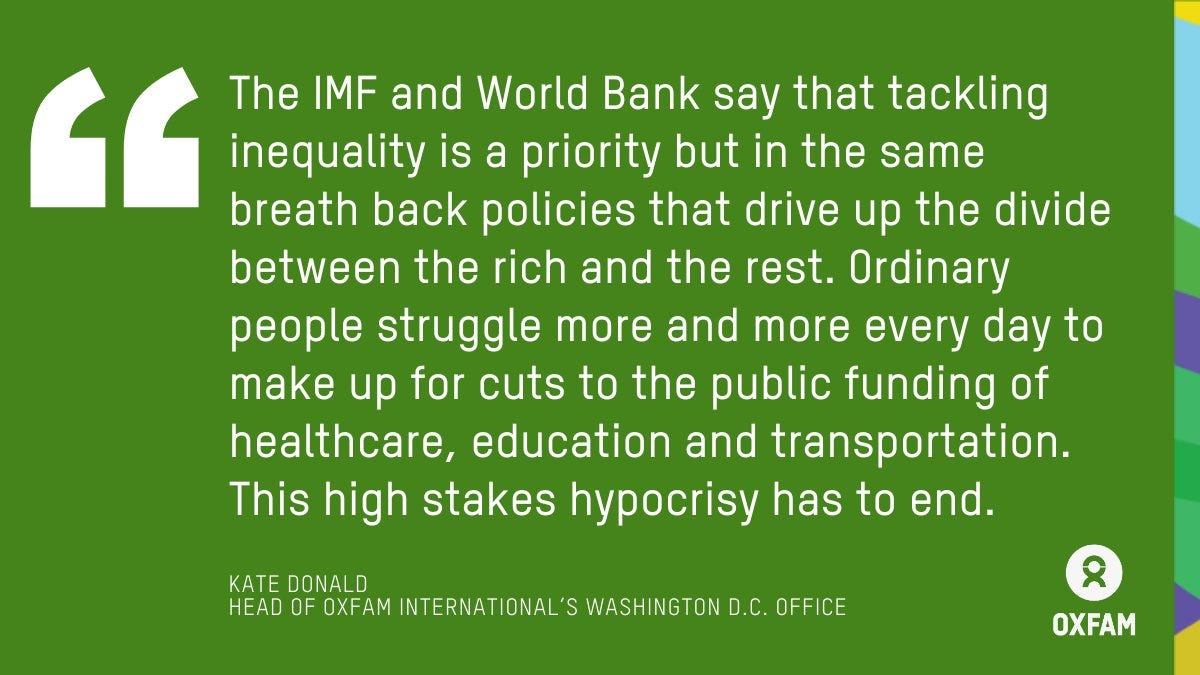The World Bank and IMF Spring Meetings in Washington D.C., recently finished, tend to pass by all but the most hardcore policy and global development geeks. But there’s a reason to care. Decisions made at and around these meetings ―on issues like debt, tax and climate finance― shape economic policy and practice that affect us all.
Last year we reported a Washington Washout. Did they Spring into action this year?
Spring meeting in numbers
Targeting the divide. The World Bank made a landmark move for the first time in its history to focus on reducing the number of countries with high inequality, defined as the number of countries with a Gini coefficient above 0.4 (this is about a third of all countries).
Backtracking before you begin? Despite this headline commitment, there were worrying signs that World Bank management are trying to water it down already; none of the detailed indicators proposed to govern the World Bank’s day-to-day work reflect this new focus on inequality at all. Some, for example on tax, are actually watered down from previous commitments, focusing now simply on raising tax, rather than on raising taxes on the richest, or not raising taxes on the poor.
Inequality rising in World Bank recipient countries. The litmus test for World Bank loans that cut inequality is that the countries receiving loans should be seeing falling inequality. However, our new analysis shows that income inequality is high or increasing in 60 percent (64 out of 106) of low- and middle-income countries receiving grants or loans from the International Monetary Fund and World Bank.
What comes next after neoliberalism? A stellar panel chaired by Rana Foroohar of the Financial Times and including Joseph Stiglitz and representatives of the Brazilian government debated the end of neoliberalism, and what comes next. Is neoliberalism over in rich countries, but alive and well in the Global South, pushed by, you guessed it, the World Bank and IMF? Is the successor to the Washington Consensus the Wall Street Consensus instead?
Dithering donors. Low-income countries are facing a growing debt crisis, as the IMF has publicly warned. And half of the countries eligible for grants and low-interest loans from IDA (the poorest countries, over half of which are in Africa) are overindebted and need 45 percent of their debt cancelled. Yet IDA contributions have flatlined in recent years. Not promising for the forthcoming replenishment.
The magic money tree. Taxing the rich could raise the trillions needed to plug huge development and climate funding gaps in the poorest countries and invest in inequality-busting policies like free healthcare and education everywhere. Our research finds that tax rates on the income and wealth of the super-rich would need to be genuinely ambitious to raise this money and tackle inequality. For example, an annual net wealth tax of anything less than 8% would fail to reduce billionaire wealth.
Four of the G20’s Finance Ministers publicly support global action to tax the richest people. The G20 Finance Ministers also met in Washington D.C., at the same time as the Spring Meetings. Regular readers will remember that this year’s G20 Chair, Brazil, is leading the charge on a global plan to ensure world’s super-rich pay their fair share in tax. Finance ministers from South Africa (next year’s G20 Chair) and Spain have added their support to those from Brazil and France. As has the German Development Minister and the Belgian government. This is historic progress; to quote ICRICT: “there are decades where nothing happens; and there are weeks where decades happen.” And there are still three months for others to sign up ahead of the G20’s Tax Declaration expected at the July Finance Ministerial.
Something to read and listen to
Washington Post looks beyond neoliberalism: As globalization unwinds, the world is still growing more unequal.
You know you are winning when: This Wall Street Journal editorial tells the world to “Watch out for a Global Wealth Tax.”
Income inequality up in 60% of IMF, World Bank recipient countries: report.
Watch our cool video on donors’ failure to deliver aid and how taxing the rich could make all the difference.



